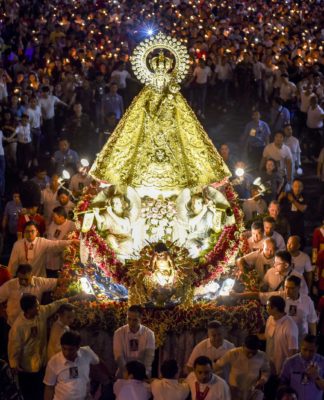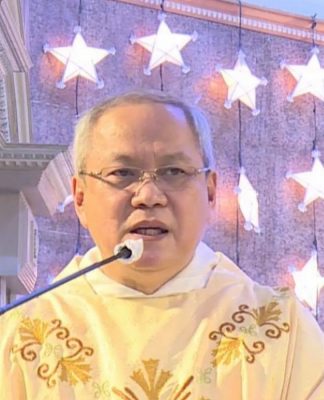FAITHFUL to the tradition of promoting campus journalism, the Varsitarian once again gathered prominent media personalities and aspiring campus writers from all over the country in Inkblots 2005, the seventh UST National Campus Journalism Fellowship.
Over 200 eager writers from different universities and colleges as far as Tuguegarao in the North and General Santos City in the South braved miles to learn from the masters themselves and from each other.
Seasoned lecturers Shiela Coronel of the Philippine Center for Investigative Journalism, Philippine Star cartoonist Rene Aranda, Philippine Daily Inquirer (PDI) columnist Rina Jimenez-David, reporter Christian Esguerra, and lifestyle writer Ruel de Vera made a comeback, but with new surprises in store for the participants.
Sports columnist and commentator Joaquin “Quinito” Henson tagged along basketball superstars Jondan Salvador and Richard Yee, and coach Ryan Gregorio of Purefoods Chunkee Giants for a mock press con with the campus press. Meanwhile, Tempo’s entertainment editor Nestor Cuartero brought along Hale lead vocalist, Champ, who was interviewed by the participants during the feature interview session.
Among the highlights of the event was the lecture on campus paper management, where Esguerra, recently named Volunteers Against Crime and Corruption’s Reporter of the Year, said campus papers should be treated seriously as any mainstream publication because they follow the same basic functions of informing, educating, shaping opinions, entertaining, and moving people to action, even if it is only within a campus.
Esguerra, a former Varsitarian editor in chief, said a publication should be consistent, standardized, and its contents must subscribe to the “canons of good taste.” The gravity of its advocacies is also important, he said.
“Our job as a school paper is to drag students from the comforts of their computer holes and to teach and educate them on the issues happening in our society,” said.
The question of a publication’s organizational structure, its independence from school administration, and the proper interpretation of Republic Act No. 7079 or the Campus Journalism Act of 1991 were also tackled.
Meanwhile, radio and TV broadcaster Arnold Clavio said he sees new hope for the Philippine media because of the idealism of young campus journalists in the face of media corruption and abuse in the country. He said there are still a few good journalists who remain active, ethical, and honest.
“Filipinos today are like journalists too,” he said. “Some are very observant and sometimes very nosy. But once tapped, they become good sources of information.”
Meanwhile, Luige del Puerto, another PDI reporter, refreshed the participants’ basic news writing skills. He stressed the importance of researching extensively about an assignment as early as possible to avoid inaccuracies.
On the other hand, former Varsitarian Filipino editor and Don Carlos Palanca Award recipient Michael Coroza stressed the importance of Filipino as a language and as a medium for reportage. With the dwindling support for Filipino, Coroza encouraged young journalists to write in their native language and keep the practice alive, considering correct syntax and wary of grammatical mistakes, especially those in verb formations.
The timely issue about the hazards of journalism in the country was discussed by former Philippine Press Institute executive director Alice Colet-Villadolid, Newsbreak managing editor Glenda Gloria, and GMA-7 reporter Jiggy Manicad. Sharing their own experiences in the Media, the panelists showed that journalism has its own perils. But once armed with proper knowledge of the Journalism Code of Ethics, nothing is too dangerous her.
Keynote speaker Charie Villa, news gathering head of ABS-CBN News and Current Affairs and former Reuter correspondent, emphasized the importance of the Code of Ethics and pointed out some numerous violations like sensationalism, which are prevalent in the Philippine media. “Credibility is everything,” she said, so journalists should learn to be responsible and “be instruments for change” in the society.
The fifth National Campus Investigative Journalism Award (NCIJA) which was founded by a retired Washington-based legal editor and former Varsitarian editor in chief Julio S. Macaranas, Jr., was suspended this year to give campus writers more time to produce and submit their entries. The awards night will be on the next year’s Inkblots instead.
Workshops like Inkblots allow experts to teach beginners and for veterans to bond with novices in a fun and educating experience. Training youngbloods in the art of campus writing prepares them for the challenges and responsibilities they are sure to face in the real world.















